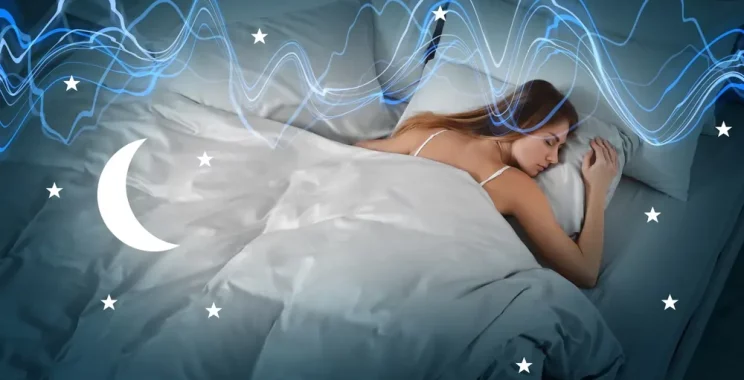What Is Circadian Rhythm
Share
Fact checked
Reviewed by experts
Updated
January 6, 2023
Quick read
4 mins to read
List of Content
Circadian rhythm is the cycle that influences our sleep-wake patterns. Scientists use the term to refer to approximately 24-hour cycles of activity and rest associated with several dynamic processes in living organisms.
In this blog post, we will explore circadian rhythm and explain how you can use your understanding of its function to maintain your health and well-being better!
What Is Circadian Rhythm
If we talk about the circadian rhythm meaning, the term refers to the internal 24-hour clock that regulates various essential body functions, such as hormone release, metabolism, and cell regeneration. In addition, several cues, including exposure to light and temperature changes, regulate this daily cycle.
How Does Circadian Rhythm Work
The circadian rhythm is an internal 24-hour “body clock” that cycles between periods of activity and rest. Let’s understand how it works in children, teens, and adults.
Circadian Rhythm in Babies
Babies’ circadian rhythm differs from adults’ as their sleep patterns tend to be more variable, with several naps during the day and longer periods of nighttime sleep.
Circadian Rhythm in Teens
Teens’ circadian rhythm differs from that of adults and children, so they tend to stay up and sleep later in the morning. The shift is usually due to hormonal changes.
Circadian Rhythm in Adults
It generally remains stable throughout life. However, as people get older, they tend to sleep less, making them more likely to experience circadian rhythm sleep disorders.
Is a Circadian Rhythm the Same As a Biological Clock
The circadian rhythm is a 24-hour cycle that governs many aspects of our physiology, including our sleep-wake cycle. It is influenced by external cues like sunlight and temperature, which is why it is often referred to as the “body clock.” On the other hand, the biological clock is a collection of cells in the brain that regulates the circadian rhythm.
How Do Circadian Rhythms Affect Health
Circadian rhythms affect physiological processes, including sleeping and eating patterns, body temperature, and hormone release. Therefore, disruptions to our circadian rhythm can significantly impact our health. For example, when our circadian rhythms are disrupted, it can lead to sleep problems and health issues.
There is growing evidence linking circadian rhythm disruptions to several severe health conditions, including cancer, heart disease, diabetes, and depression. Researchers believe this is because disruptions to our circadian rhythms can cause hormone level changes, leading to these health problems.
Factors That Can Change Circadian Rhythms
Several factors can influence circadian rhythm, including –
- Light exposure during the day
- Exposure to light at night
- The type of light exposure (natural versus artificial)
- Travel
- Shift work
- Age can influence how well circadian rhythms are maintained
- Production of the sleep hormone melatonin helps regulate our sleep-wake cycles
How To Maintain a Healthy Circadian Rhythm
The circadian rhythm helps regulate the body’s sleep-wake cycle. Getting enough rest and recharging the body’s batteries can be challenging without a healthy circadian rhythm. You can follow the given tips to maintain a healthy circadian rhythm –
Follow a Consistent Sleep Schedule
Try going to bed and waking up at the same time daily.
Get Daily Exercise
Incorporate some form of daily physical activity into your routine. Aim for at least 30 minutes of moderate-intensity physical activity most days.
Avoid Caffeine
Caffeine is a stimulant that can disrupt sleep patterns and negatively impact your health. Therefore, avoiding caffeine is best, especially in the evening.
Limit Light Before Bed
Studies have shown that light exposure can disrupt the body’s natural sleep cycle. To avoid this, make sure to dim the lights in the evening and avoid using screens for at least an hour before bed.
Keep Naps Short and Early in the Afternoon
Naps are a great way to re-energize yourself during the day, but if you nap for too long or too late, it can disrupt your circadian rhythm.
When to Seek Doctor’s Help
If you feel like you constantly have jet lag, even if you haven’t been on a plane, it’s worth talking to your doctor. Shift work sleep disorder is another condition that can wreak havoc on your internal clock. Discuss your sleep habits with your doctor so they can help you get back on track.
Conclusion
Circadian rhythm is essential to our daily lives, governing everything from when we feel tired to when we are most alert. Understanding how it works and how it affects our health is essential in making sure we get the most out of our days. Several factors can influence our circadian rhythm, so it’s essential to be aware of them and maintain a healthy balance.
FAQs
The body makes and keeps its circadian rhythms with a particular type of cell called the suprachiasmatic nucleus (SCN). This cell is located in the hypothalamus, a brain region controlling many critical bodily functions.
Traveling across time zones may experience jet lag because the new light exposure schedule can disrupt the body’s circadian rhythms.
The 4 major circadian rhythms are – the sleep/wake cycle, the body temperature cycle, the hormone cycle, and the blood pressure cycle.
You may experience constant jet lag and exhaustion during the day but trouble sleeping at night.
An example of a circadian rhythm is the body’s natural sleep-wake cycle. This cycle is regulated by releasing certain hormones, including melatonin, that signal to the body when it is time to sleep or wake up.
This website does not offer medical advice nor professional medical services; rather, it is provided solely for educational, informational, and/or entertainment purposes. Individuals seeking medical advice should consult a licensed physician. The information provided should not be used for diagnosis or treatment of any condition, disease, or injury. When you have a medical condition, you should always talk to licensed doctor or other certified medical professional. You should never delay seeking professional medical advice or treatment based on the contents of this website. Call 911 or immediately go to the nearest emergency room if you think you may have a medical emergency. The contents of this website are provided “as-is”, Sleep Authority and its parent, subsidiaries, affiliates, employees, contributors disclaim any warranty of the information contained herein. Please contact using contact form to report any errors, omissions, misinformation, or abuse.
Sleep Authority is brought to you by Resident, the company that brings you Nectar, DreamCloud, Awara, Wovenly, Bundle, Home Well Designed and Level Sleep.

